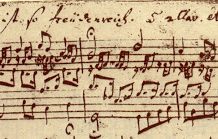When King Herod was holding court, all the best and brightest newspapers, reporters, gossip-mongers, and talking heads were constantly in attendance trying to get a scoop on the latest news from the palace. This was the place to be—the inner circle of the king, the seat of government—and all the big-wigs of the day were there. Yet they all missed the biggest story of human history: in a remote part of the countryside (more or less in the middle of nowhere) in a two-bit town called Nazareth, the future of the world was being changed by a father teaching his son, the young Christ, how to sharpen carving knives and chisels and how to hang a cupboard door. As a grown man, this son of Joseph’s started a Church and gave the top job to a fisherman.
I think that this quality of Catholicism is what sticks in the craw of so many professional politicians, bureaucrats, and palace creep-hangers: that the Faith itself is passed on by ordinary means. That is, the Faith is passed on within each family living the life of Nazareth. Home and family is the place to nurture faith; not for us the grand plan, the big project, the think-big advertising campaign. Our religion is passed on to one person at a time, child after child nurtured in the domestic church, a convert here, a convert there.
When God called St. Francis to rebuild the church, Francis responded by rebuilding an abandoned building stone by stone. He eventually discovered that the stones were being replaced with friars, with a church rebuilt, friar by friar, in one country after another. That construction is still going on, following the same plan of stone by stone, house by house, priest by priest, parish by parish.
It is not an exaggeration to say that one of the major strategies used in the attack on the Catholic Faith is to attack fatherhood and the father’s place in the family and home. One strategy is to remove the father from the daily life of the family, whether with long hours at work, or play, or a never-ending series of committee meetings, so that there is little chance for a father’s wisdom to be passed along to his daughters and sons.
The other attack on fatherhood, perhaps more vicious, is to unman fathers. When you read this, we will have a new Pope, a new Holy Father. Being without a pope these last few weeks has been a rather strange experience, one we do not go through very often. It was strange having a temporary gap in the Church where the authority of Peter normally resides.
Fathers are the seat of authority in a home (Rerum Novarum) and, when unmanned, there exists a gap in that authority. The father’s authority should never be heavy-handed; quite the opposite. The practice of authority by a father is meant to reveal to his children the love Our heavenly Father showed for us when he sent us his Son to die and be raised again. St. Joseph had this authority in the Holy Family at Nazareth. As head, it was his job to make the domestic church a place of safety and joy for the heart of the home (Rerum Novarum), Our Lady and Our Lord. The modern confusion with words such as authority, or the idea of the head of the home, comes from our mistaking the idea of being the head with being the boss. The father is not the boss, he is the servant, just as the servant of servants of God is our Papa, the Pope, the Holy Father himself.
In our homes, it is the role of the father to teach, as St. Joseph did at Nazareth, such things as building a tree fort, chopping firewood, fishing, hunting, and making things. It is entirely appropriate that this magazine is under the patronage of St. Thérèse of Lisieux, for she embodies this undramatic approach to our Faith: sanctifying the ordinary by a heart filled with love for Christ. She teaches us the importance of doing the simple things right: fathers building a rink with their children, spending time with them, and being present in their homes. In many ways it is St. Thérèse who manifests the hidden life of Nazareth for us.
If this means we must leave the confines of Herod’s palace for such backwater Nazareths that exist across Canada to achieve this, then so be it—whether we move house or simply use wire cutters on the television cable. St Francis did this, and so did St. Thérèse, and so did St. Joseph.












